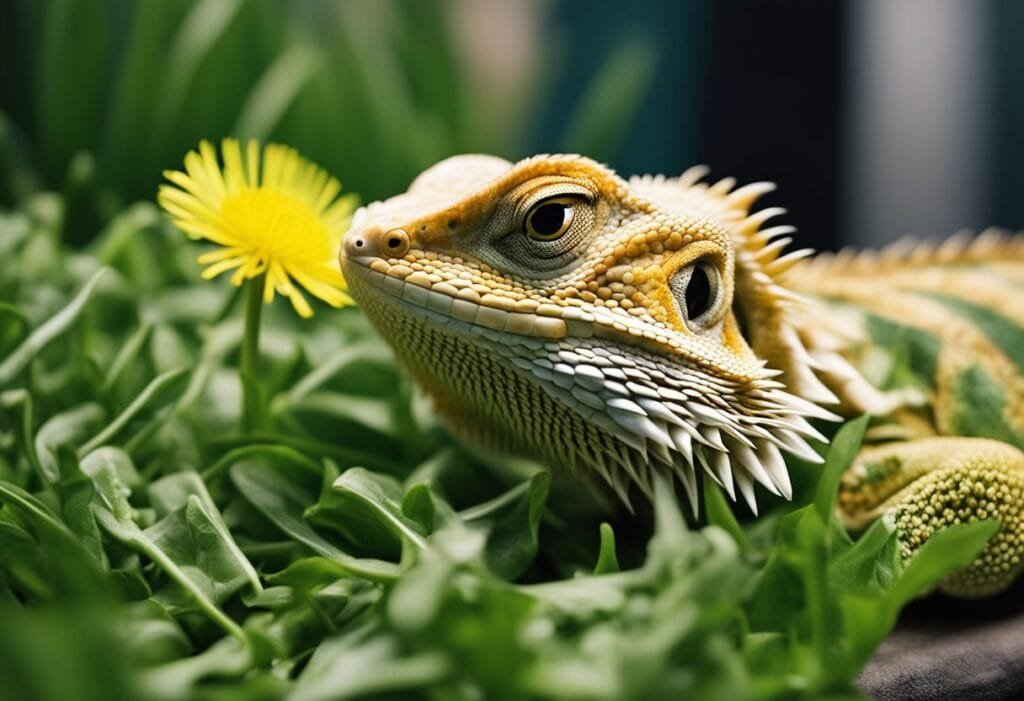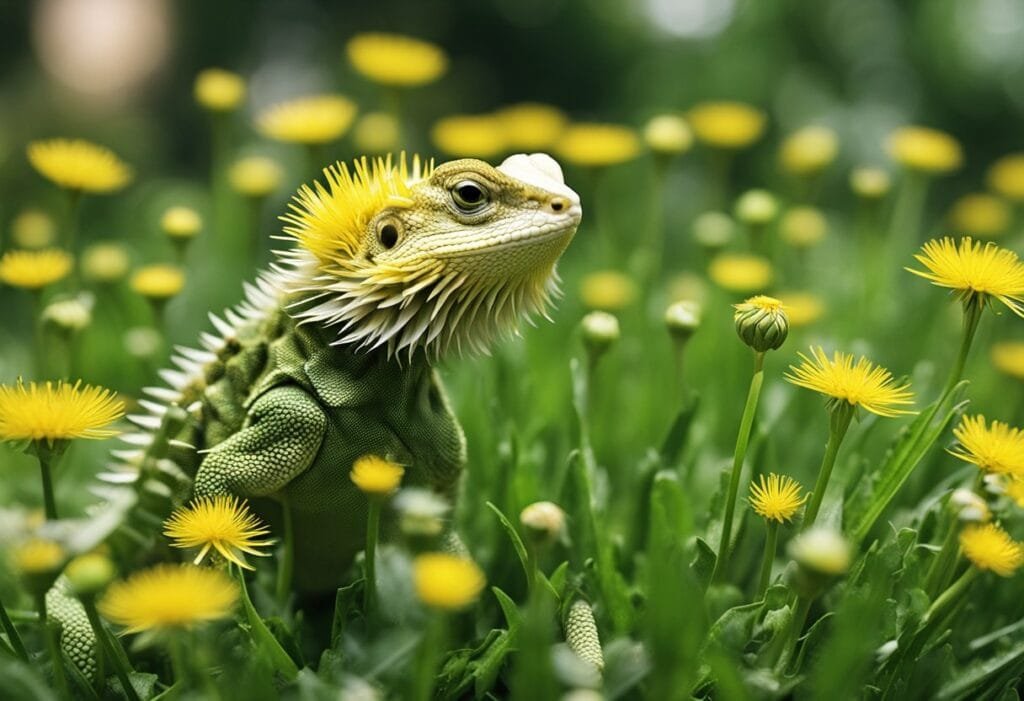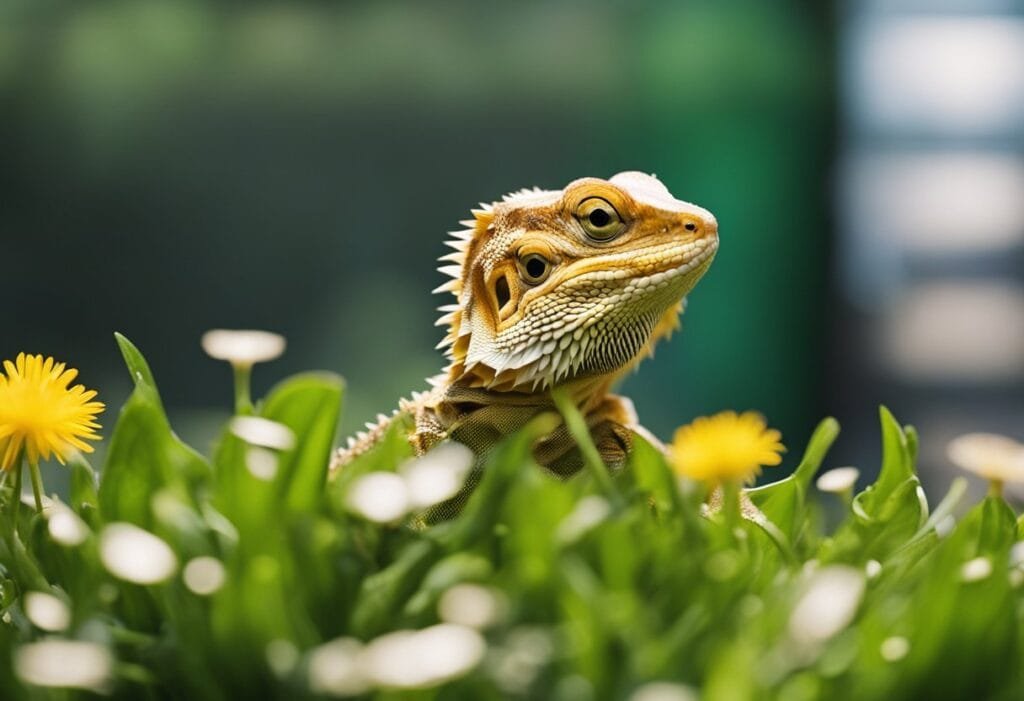Bearded dragons are popular pets that require a balanced diet consisting of vegetables, fruits, and insects. However, not all greens are safe for them to consume. One of the common questions that bearded dragon owners ask is whether their pets can eat dandelion greens.
The answer is yes, bearded dragons can eat dandelion greens. In fact, dandelion greens are a nutritious addition to their diet, providing essential vitamins and minerals such as vitamin A, calcium, and iron. They also contain antioxidants and are low in oxalates, making them a great option for bearded dragons.
It is important to note that while dandelion greens are safe for bearded dragons to eat, they should be fed in moderation as part of a balanced diet. Overfeeding can lead to health problems such as obesity and digestive issues. It is always best to consult with a veterinarian or a reptile nutritionist to ensure that your bearded dragon is getting the proper nutrition it needs.
The Basics of Bearded Dragon Diet

Bearded dragons are omnivores, which means they eat both plants and animals. In the wild, their diet consists of insects, small rodents, and a variety of plants. As pets, they can be fed a diet that closely mimics their natural diet.
It is important to provide a balanced diet for your bearded dragon to ensure that they receive all the necessary nutrients. A diet that is too high in protein can lead to kidney problems, while a diet that is too high in vegetables can lead to vitamin deficiencies.
Here are some basic guidelines for a healthy bearded dragon diet:
- Protein: Bearded dragons should be fed a variety of insects, such as crickets, mealworms, and dubia roaches. The amount of protein they need varies depending on their age and size, but generally, adults should be fed insects once or twice a week.
- Vegetables: Bearded dragons should be fed a variety of vegetables, such as collard greens, kale, and squash. Dandelion greens are also a great addition to their diet. Vegetables should make up the majority of their diet.
- Fruits: Bearded dragons can also be fed a small amount of fruit, such as berries, apples, and mangoes. Fruit should be given as a treat and not as a regular part of their diet.
- Calcium: Bearded dragons need calcium for healthy bones and to prevent metabolic bone disease. Calcium can be provided by dusting their food with a calcium supplement.
- Water: Bearded dragons need access to fresh, clean water at all times. They can drink from a shallow dish or from a water bottle.
By following these guidelines, you can ensure that your bearded dragon receives a healthy and balanced diet.
Can Bearded Dragons Eat Dandelion Greens?

Dandelion greens are a great addition to a bearded dragon’s diet. They are a good source of fiber, vitamins, and minerals. In fact, dandelion greens are one of the most nutritious greens you can feed your bearded dragon.
Dandelion greens are high in calcium, which is important for bone health. They also contain vitamin A, which is essential for good vision and a healthy immune system. Dandelion greens are also a good source of vitamin C, which is important for a healthy immune system.
When feeding dandelion greens to your bearded dragon, it is important to make sure that they are organic and free of pesticides. You should also wash them thoroughly before feeding them to your dragon.
Bearded dragons can eat dandelion greens both raw and cooked. If you choose to cook the greens, be sure to do so without adding any oils or seasonings. You can also mix dandelion greens with other greens, such as collard greens or mustard greens, to provide your bearded dragon with a variety of nutrients.
Overall, dandelion greens are a great addition to a bearded dragon’s diet. They are nutritious, easy to find, and easy to prepare. Just be sure to feed them in moderation, as too much of any one food can be harmful to your dragon’s health.
Nutritional Value of Dandelion Greens
Dandelion greens are a great source of nutrition for bearded dragons. They are low in calories and high in fiber, vitamins, and minerals. Here are some of the key nutrients found in dandelion greens:
- Vitamin A: Dandelion greens are a rich source of vitamin A, which is important for maintaining healthy skin, eyes, and immune function.
- Vitamin C: Dandelion greens are also high in vitamin C, which is an antioxidant that helps protect cells from damage.
- Calcium: Bearded dragons need calcium for healthy bones and teeth, and dandelion greens are a good source of this mineral.
- Iron: Dandelion greens contain iron, which is important for transporting oxygen in the blood.
- Potassium: Dandelion greens are a good source of potassium, which helps regulate blood pressure and supports heart health.
In addition to these nutrients, dandelion greens are also high in antioxidants and have anti-inflammatory properties. This makes them a great addition to a bearded dragon’s diet.
It’s important to note that while dandelion greens are a nutritious food for bearded dragons, they should not be the only food they eat. A balanced diet for a bearded dragon should include a variety of vegetables, fruits, and insects.
How to Prepare Dandelion Greens for Your Bearded Dragon
Dandelion greens are a nutritious and tasty addition to your bearded dragon’s diet. Here’s how to prepare them for your pet.
Washing and Cleaning
Before feeding dandelion greens to your bearded dragon, it’s important to wash and clean them thoroughly. Here’s how:
- Rinse the dandelion greens under running water to remove any dirt or debris.
- Soak the greens in a bowl of water for a few minutes to loosen any dirt or sand.
- Gently scrub the leaves with your hands to remove any remaining dirt or debris.
- Rinse the greens again under running water to remove any soap or dirt.
Once the dandelion greens are clean, you can move on to preparing them for your bearded dragon.
Serving Suggestions
There are a few different ways to serve dandelion greens to your bearded dragon. Here are some ideas:
- Chop the greens into small pieces and mix them in with your bearded dragon’s regular food.
- Offer the greens as a standalone treat.
- Use the greens as a base for a salad, adding other vegetables and fruits that are safe for bearded dragons.
Remember to always supervise your bearded dragon while they are eating and to remove any uneaten food after a few hours to prevent spoilage.
Overall, dandelion greens are a great addition to your bearded dragon’s diet, but like any new food, it’s important to introduce them gradually and monitor your pet for any adverse reactions.
Potential Risks and Precautions

When it comes to feeding our bearded dragons, we always want to make sure that we are providing them with the best possible diet. While dandelion greens are generally considered safe for bearded dragons to eat, there are a few potential risks and precautions that we should be aware of.
Pesticide Exposure
One concern when feeding dandelion greens to our bearded dragons is the potential for pesticide exposure. Dandelions are often found growing in lawns and other areas where pesticides may have been used. If we are not sure whether the dandelions we are feeding our bearded dragons have been exposed to pesticides, it is best to avoid them altogether.
Overconsumption
Another potential risk when feeding dandelion greens to our bearded dragons is overconsumption. While these greens are a great source of nutrition for our pets, they should be fed in moderation. Too much dandelion greens can lead to digestive issues such as diarrhea and bloating.
To prevent overconsumption, we should offer dandelion greens as part of a varied diet that includes other safe vegetables and fruits. We should also make sure that we are not feeding our bearded dragons too much at once, and that we are monitoring their food intake and digestive health closely.
In summary, while dandelion greens can be a healthy addition to our bearded dragons’ diet, we should be aware of the potential risks and take precautions to ensure their safety and well-being. By being mindful of pesticide exposure and preventing overconsumption, we can continue to provide our pets with a nutritious and balanced diet.
Alternatives to Dandelion Greens in Bearded Dragon Diet
While dandelion greens are a great source of nutrition for bearded dragons, there are other vegetables and greens that can be added to their diet as well. Here are some alternatives to dandelion greens that can be included in a bearded dragon’s diet:
Collard Greens
Collard greens are a great alternative to dandelion greens as they are high in calcium and vitamin A. They are also low in oxalates, which can be harmful to bearded dragons in large amounts. Collard greens can be fed raw or cooked, but it is recommended to cook them to reduce the amount of oxalates.
Mustard Greens
Mustard greens are another great alternative to dandelion greens. They are high in vitamin A and calcium, and are low in oxalates. Mustard greens can be fed raw or cooked, but it is recommended to cook them to reduce the amount of oxalates.
Turnip Greens
Turnip greens are a good source of calcium and vitamin A, and are low in oxalates. They can be fed raw or cooked, but it is recommended to cook them to reduce the amount of oxalates.
Endive
Endive is a good source of calcium and vitamin A, and is low in oxalates. It can be fed raw or cooked, but it is recommended to cook it to reduce the amount of oxalates.
Escarole
Escarole is a good source of calcium and vitamin A, and is low in oxalates. It can be fed raw or cooked, but it is recommended to cook it to reduce the amount of oxalates.
Overall, it is important to provide a variety of vegetables and greens in a bearded dragon’s diet to ensure they are getting all the necessary nutrients. While dandelion greens are a great option, there are other alternatives that can be included to provide a well-rounded diet.
Conclusion

In conclusion, dandelion greens are a great addition to a bearded dragon’s diet. They are high in nutrients such as calcium, fiber, and vitamins A and C. However, it is important to note that dandelion greens should not be the only food in a bearded dragon’s diet. A varied diet including other greens, vegetables, and insects is necessary to provide a balanced diet.
When feeding dandelion greens to your bearded dragon, it is important to make sure they are pesticide-free and thoroughly washed. It is also important to feed them in moderation, as too much can cause digestive issues.
Overall, dandelion greens can be a healthy and tasty addition to your bearded dragon’s diet when fed in moderation and as part of a balanced diet.
Frequently Asked Questions
Are dandelion greens safe for bearded dragons to eat?
Yes, dandelion greens are safe for bearded dragons to consume. In fact, they are a great source of nutrition for these reptiles. Dandelion greens are high in calcium, fiber, and other essential vitamins and minerals that bearded dragons need to stay healthy.
Can baby bearded dragons consume dandelion greens?
Yes, baby bearded dragons can eat dandelion greens. However, it is important to make sure that the greens are chopped into small pieces to avoid choking hazards. It is also recommended to introduce new foods gradually to ensure that your baby bearded dragon can tolerate them.
What other types of flowers can bearded dragons eat?
Bearded dragons can eat a variety of flowers, including hibiscus, nasturtiums, and roses. However, it is important to make sure that the flowers are free of pesticides and other harmful chemicals before feeding them to your bearded dragon.
Where can I purchase dandelion greens for my bearded dragon?
Dandelion greens can be found at most grocery stores and farmers markets. It is important to choose organic greens to avoid any harmful chemicals or pesticides that could be harmful to your bearded dragon.
Is it recommended to feed bearded dragons a diet consisting of dandelion greens?
While dandelion greens are a great source of nutrition for bearded dragons, it is important to provide them with a varied diet that includes other vegetables, fruits, and protein sources. A diet consisting solely of dandelion greens could lead to nutritional deficiencies and other health problems.
What kinds of greens should bearded dragons avoid consuming?
Bearded dragons should avoid consuming greens that are high in oxalates, such as spinach and kale. These greens can bind to calcium and prevent its absorption, leading to metabolic bone disease. It is also important to avoid feeding bearded dragons greens that are high in goitrogens, such as broccoli and cabbage, as they can interfere with thyroid function.

I, Mark Antonelli am highly interested in pet care tips. The experiences I gained through university life in animal sciences were also helpful to identify the best tricks for caring for and feeding varying kinds of pets. I know the majority of people love to own a pet. Yet, there is a guilty of owing a Bearded Dragon due to a lack of information about how much friendly and peaceful they are. I thought of filling this gap with detailed writings about this Pogona genus Bearded Dragon. All my team is also giving me great support to fulfil my mission. Hope you will enjoy the journey with us.

